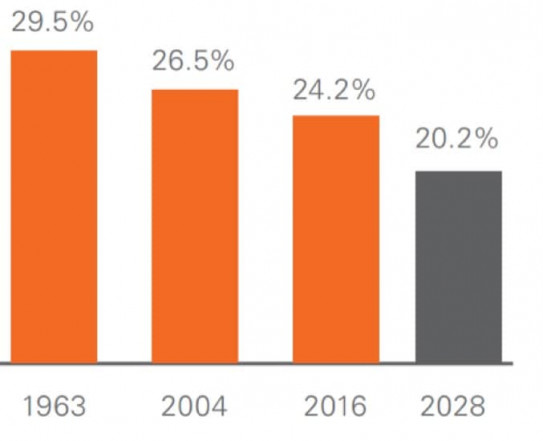
Applying an omnichannel strategy within the framework of the 'experience economy': why do consumers want experiences and how can companies provide them?
The 'experience economy' is growing fast and many companies struggle to satisfy consumers' increasing expectations. Retailers can no longer content themselves with providing products and information.
They are expected to create experiences that have value in the eyes of customers. Interactions with a brand have become not only digital and more cross-cutting, but seamless between the various touchpoints. Retailers must devise an omnichannel strategy now if they want to continue to do business tomorrow. However, adopting an omnichannel approach is a real challenge if the reasons for doing so are not understood. Thus why is the experience economy so relevant?
Getting a good cup of coffee rapidly and with ease is considered to be a service. As Joseph Pine, co-author of the book Experience Economy explains:
"Only when it becomes memorable, that's when it becomes an experience."
With James Gilmore, he describes an evolving step in the process of creating economic value, the other steps being the agrarian economy (for basic foodstuffs), the industrial economy with the sale of goods, and the arrival of the service economy in the twentieth century. Today, companies are beginning to create memorable customer experiences in all channels, in order to stand out from their competitors; we are seeing the emergence of the experience economy. The high price of a cup of coffee at Starbucks is justified by access to a complete experience: customers can choose from a vast selection, place an order with ease, pick up their order rapidly, pay without queuing, enjoy a high level of service and earn loyalty points.
These are the assets of a brand that offers a lifestyle, bringing another dimension to drinking coffee. A local establishment can serve coffee that is cheaper, but this service will now be seen as a product, rather than an experience. These changes are easy to see, but why are our preferences shifting towards experiences?
What consumers want: drivers of the experience economy
Thanks to 4G Internet, consumers are now able to access any information source, in any place and at any time. They are permanently connected and the slightest piece of information is available at all times. Technology is the main factor driving our behaviours. In addition to the development of high bandwidth and smartphones, there are cloud platforms, which play an essential role by enabling individuals to come together, share experiences and create new communities focussed on personal interests and services. This has led to the opening up of global markets and the emergence of niche markets, and has transformed the way we interact and communicate. The massive flow of interactions created has modified relationships between consumers and brands. Because competition is accessible in a click, relationships with brands are now based on the customer rather than transactions. Your offering must meet the customer's needs first and foremost, while being suited to the context, in order to be relevant. You must therefore identify customers, know their behaviours and leave an impression that makes you stand out from your competitors and remains etched in their memories, whatever the channel used: this is the omnichannel experience. For generation Y, this experience has even become more important that the concept of ownership. This preference for experiences is driven by factors such as aspiration for recognition on social networks and the 'Fear Of Missing Out', or 'FOMO'. What counts is not what you are wearing or driving, but what you are?doing?at any given time.
Money is now spent on experiences
Have you recently bought a product or service to get an amazing customer experience, without looking at the price or what's on offer from competitors beforehand?
Well, you're not alone, as shown by a study conducted by Deloitte. 89% of customers surveyed in the United States and United Kingdom said that they have taken decisions based more on the customer experience than the price of the product or the product itself. Six years ago, the proportion was only 12%. According to a study conducted by the Harris Group, 72% of consumers in generation Y prefer spending their money to buy experiences, rather than material possessions. Instead of a house, a car, a television or a watch, they prefer festivals, events, travel and a life full of experiences. The proportion of spending on experiences "to be lived", in relation to total consumption in the United States has risen by 70%. In the United Kingdom, we are also seeing the decline in retail sales speeding up and a shift of consumption spending?towards leisure, culture and communication.

Consumption spending in the United Kingdom for retail sales, as a percentage. Source: ONS, Retail Economics Analysis
Consequences for companies: deploy an omnichannel strategy of close up shop
Everything is different in the experience economy: channels, mainly digital, are more numerous, consumers behave differently and have greater expectations, and what they see as important has also changed. Because of its impact on the two main factors that determine your business – your relationship with customers and the value you create – being omnichannel is essential to surviving in the experience economy. In the omnichannel world, new principles have emerged:
- The customer is now in control. Customers today no longer buy in the same way because they can access all the information they need. Elsewhere, the Internet is levelling the playing field in terms of products: everything that can become digital will eventually do so. And, if your offering is digital, the whole world can be a competitor. But the whole world can be your customer too. It is, therefore, essential to stand out.
- Each interaction with customers counts. Not only do you need to be present in each channel used by your customers, you must bear in mind that each interaction is seen as an experience in terms of what you are offering. You will stand out from your competitors by offering memorable experiences. Customers do not make a distinction between channels; they experience a brand, period. They do not care about your silos and the intricacies of how your company has grown over the years. Any company, big or small, able to offer a better experience will win over customers.
- The customer experience must be improved by exploiting data. By knowing about the history of your customers, what they are interested in, their preferences and their behaviour, and deducting what the best possible offering is, you will be able to create remarkable experiences. The next phase in e-commerce will be based on algorithms generated by AI (artificial intelligence) and it is advisable, in anticipation, to adopt a vision based on data in order to forecast customer behaviour. If you do not get on board with these technologies now, you will see your customers leave in the future.
In order to deploy an omnichannel strategy, you need to understand your customers first
In the experience economy, there is more distance between customers and companies than ever before. A sharp focus on customers is crucial to ensuring the future of your business. This will force you to adopt a resolutely digital approach, think in terms of experiences rather than transactions, and constantly strive to identify what your customers like and value. Deploying an omnichannel strategy means knowing your customers. It will enable you to move forward and reshape your customer relationships, in line with the experience economy.